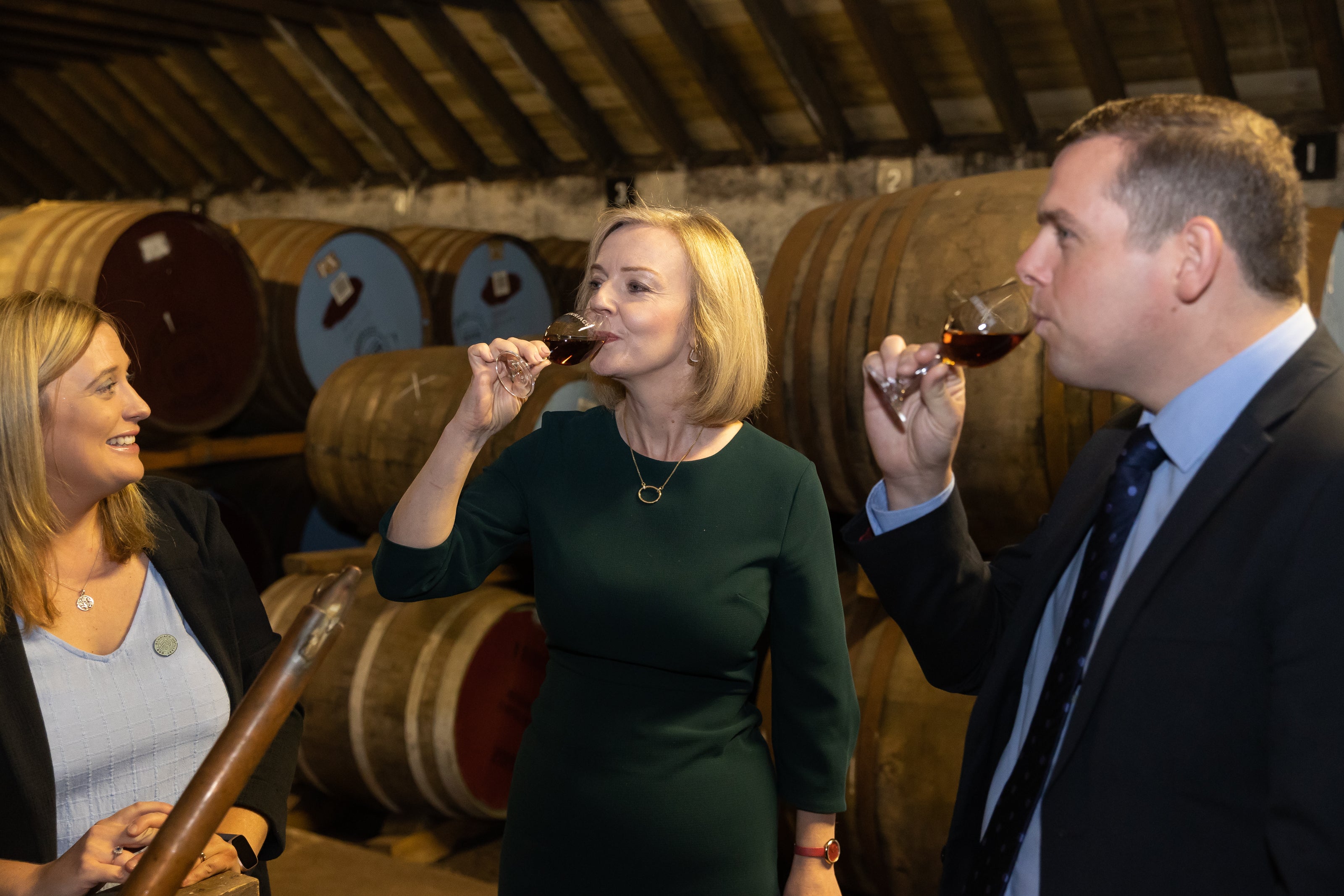Liz Truss rejects ‘sticking plaster’ solutions to cost-of-living crisis
The Tory leadership frontrunner reiterated her plan to cut taxes for households.

Liz Truss has rejected “sticking plaster” approaches to tackle the cost-of-living crisis, as she appeared to dismiss Labour’s £29 billion plan to target soaring energy costs.
The Tory leadership frontrunner, speaking to reporters in Scotland ahead of the latest round of hustings in Perth, reiterated her plan to cut taxes for households.
Sir Keir Starmer tried to seize the initiative this week, with a costed £29 billion plan to stop energy bills rising this winter, paid for in part by an extension of the windfall levy on the profits of the oil and gas companies.
He also accused Ms Truss and Rishi Sunak of lacking ideas to solve the crisis.
Speaking to reporters at a whisky distillery in Elgin, north-east of Inverness, she said it was wrong to focus on “sticking plasters”.
“We’re still in the leadership contest at the moment. Now, my priority is reducing taxes so people can keep more of their own money at the same time as making sure we boost energy supply.
“It is wrong to just keep sticking plasters on this problem.
“What we actually need to do is make sure we are unleashing more energy, for example, from the North Sea.
“We’re investing in technologies like nuclear, and we’re finding more renewable energy as well.
“We need to solve this problem for the long term.”
Both Ms Truss and Mr Sunak have faced calls in recent days to take urgent action to tackle the cost-of-living crisis gripping households, even as Downing Street ruled out once again any co-ordination between Boris Johnson and his two would-be successors to offer more immediate solutions to the issue.
Mr Sunak’s campaign hit out at his rival on Tuesday, urging her to “come clean” on her cost-of-living plan.
A campaign spokesperson said: “It’s not good enough to say wait until late September. Families need certainty now – bills are going to go up and wages have taken a hammer blow from rising inflation.”
The Foreign Secretary, who is seen as the favourite to replace Boris Johnson as prime minister in a few weeks, was given a chance to sample some local whisky during the visit with Scottish Conservative leader Douglas Ross.
Ms Truss and Mr Sunak will face off in a hustings in Perth later this evening, before heading to Belfast for another hustings on Wednesday.
Both are expected to be grilled on Scottish independence, devolution and their plans to tackle inflation during the hustings on Tuesday.
It comes as a new poll revealed that a quarter of Scots would be more likely to support Scottish independence regardless of who becomes the next prime minister.
The poll, a survey of 1,002 Scots done by Survation and Diffley Partnerships for Charlotte Street Partners, also asked if voters were more likely to support Scottish independence if Ms Truss were to win No 10.
Twenty per cent said they were “much more likely”, while 5% said they would “a little more likely” to back separation.
Some 22% said Ms Truss’ appointment would not change their view and they would support independence regardless, while 36% said they did not support independence and her election would not change that stance.
When asked the same question in reference to Mr Sunak, 19% said they were much more likely, while 7% said they were a little more likely.
Asked about the 25% of people who told the poll they were more likely to back independence if Ms Truss wins, she vowed to “deliver for the people of Scotland” to win over voters.
She told reporters: “I’m somebody who was partly brought up in Scotland, and I care passionately about this country.
“What people care about when they come to vote in an election is who is delivering.”
Ms Truss, who received a boost on Tuesday as 11 Government whips declared their backing for her, stressed the need for investment and low taxes in response to official figures showing workers’ pay lagging behind inflation at record levels.
She told broadcasters: “What’s very important is we get our economy growing. We are unleashing investment right across the United Kingdom.
“I’m here at a whisky distillery talking about how it’s important that we back industries like the whisky industry, we get more investment in. That’s why it’s important we keep taxes low.
“We unleash investment by changing the rules we have at the moment which rolled EU rules and we turbocharged growth right across our economy. That is the best way to deliver better wages, but also more jobs and more growth.”
Bookmark popover
Removed from bookmarks